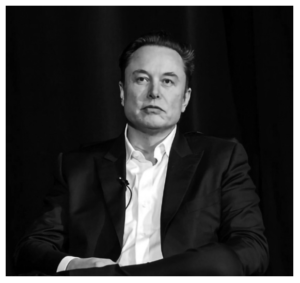In the last half century, the disparity between the regular workers and company CEOs has grown exponentially. While the average CEO’s pay has grown over 1,200 percent since 1978, according to the Economic Policy Institute, typical worker pay has only risen by a comparatively miniscule 15.3 percent.
While no one expects an average worker’s salary to equate with that of a CEO, few would reasonably expect CEOs to be paid nearly 344 times as much as their typical workers. By comparison, a CEO in 1965 would make, on average, 21 times more than the average worker at the same company.
This massive chasm between the average worker and their CEO was nearly unheard of during many of our working years. It exemplifies the corporate greed of many of the most high-profile executives of the modern-day corporation.
 Tesla CEO, Elon Musk, has been in the news for his $56 billion pay package. Photo by Trevor Cokley.
Tesla CEO, Elon Musk, has been in the news for his $56 billion pay package. Photo by Trevor Cokley.
“Exorbitant CEO pay is not just a symbolic issue—it has contributed to rising inequality. Escalating CEO pay in recent decades has spilled over to fuel wage growth at the top of the wage scale more generally, and this has left fewer gains for ordinary workers,” said Josh Bivens, EPI chief economist and co-author of the Economic Policy Institute report.
There has recently been some judicial pushback against CEO compensation packages that are seen to be excessive. Tesla CEO Elon Musk’s $56 billion pay package—ranked the largest corporate pay package in the United States by corporate pay analysis firm Equilar—was nullified by a Delaware Court in January.
Delaware Chancery Court Chancellor Kathaleen McCormick called the company’s compensation process “deeply flawed.” The lawsuit argued that the outsized influence Musk had over the negotiation process was deemed excessive, and Tesla’s Board of Directors breached their fiduciary duties to investors in approving it.
For many years the Association has fought to mitigate these bloated corporate packages through our “Golden Parachute” proxy proposals at Verizon. These massive companies often look to each other to justify their own executive compensation, so this type of decision from the Delaware Chancery Court is a step in the right direction.
The hubris that allows CEOs like Musk to spend $44 billion on the vanity purchase of a social media platform—and selling his own shares in the company that gave him such outsize compensation in the first place in order to do so—is galling when juxtaposed with the austerity applied to pay packages for the rank-and-file employees who make the CEO’s “vision” a reality.
Ironically, since Twitter, or X’s value has nosedived, Musk is now demanding a new contract from Tesla with a request to effectively claw back 25 percent of Tesla stock from its shareholders.
There are currently efforts underway in Congress to potentially limit these excessive pay patterns and packages across corporate America.
U.S. Senator Bernie Sanders is leading the charge with a bill that could raise taxes on any company that pays their Chief Executive Officer over 50 times the typical worker.
In a press release describing his bill, Sen. Sanders projects that this legislation would generate $150 billion in new tax revenue over 10 years. Here’s how it would affect some companies:
- Google would pay $3.07 billion more in taxes.
- JPMorgan Chase would pay up to $1.04 billion more in taxes.
- Home Depot would pay up to $840 million more in taxes.
- Walmart would have to pay up to $754 million more in taxes.
- Nike would pay up to $233 million more in taxes.
- McDonald’s would pay up to $92 million more in taxes.
Given all the dysfunction on Capitol Hill and the pandering to major corporate interests, good luck in getting anything like corporate oligarch tax passed into law.